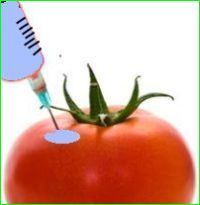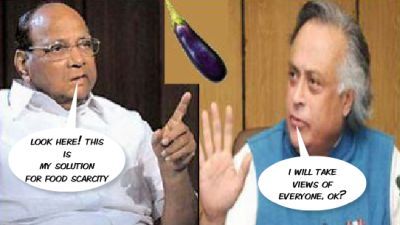Have a Bt Brinjal a Day - Part II
Contd. from Part I here
Concluding Part II

It has been suggested that after the products are approved they should be subject to rigorous regulations, monitoring and control. Does such a regime seem feasible? It can only be talked about not practiced. Taking the specific situation of our country with millions of farmers, a long supply chain and logistics issues, regulations will be on paper and any effort to seriously implement, monitor and control would only lead to creating a costly maze of machinery which will keep chasing the goose. Once the genie is let loose, he will break the lamp from where he came and do what it wants, freed from his master. This is all the more so because the master does not know enough about the genie in the first place and the harm that can be caused is unpredictable and will be unexpected.
Even independent verification of data submitted by the applicant entities would serve little purpose because that again would be based on existing protocols which do not take into consideration the very real apprehensions about unforeseen events once the products enter the food chain. The real danger is that of one or more unexpected, uncontrollable events, which cannot be ignored.
It is also suggested that no GM foods should be introduced till there is a labeling regulation in place so that people can make informed choices. If the government is determined to proceed with the introduction, it may well propose to evolve strict labeling laws to silence such objectors. Will that do? Emphatically not. Labeling of GM foods is good only for intellectual discussions. It is an impossible and meaningless idea and once a GM product enters the food chain at the farm level, there is no way to label the food to achieve the so-called choice. Talking of labeling even imported packed processed foods for example, is a sheer absurdity and has no relevance in our country. It will simply provide a ruse to the Government to allow GM foods. Apart from not being capable of meaningful control, such labels would not make any sense for the average consumer except the intellectuals making the suggestion.
Case by Case Consideration
To offer a palliative, it has been highlighted that the approval would be on a case by case basis and so if the specific Bt Brinjal is approved now, it does not mean that new products can automatically enter the environment. What is wrong with this logic? A lot. As anyone used to the way in which a government works, precedent is what is important. Once a precedent is established, regardless of case by case consideration, essentially the same principles as well as procedures would have to be followed unless there are completely new situations. Once Bt Brinjal comes in, it will be quickly followed by corn, Jowar(Sorghum), rice, Okra and others. There are 25 kinds of rice, 23 kinds of tomatoes, groundnut, pigeon peas, potato, mustard, sugarcane, soya etc. awaiting GEAC approval. Before long, millions of farmers would become dependent on GM seeds forever.
The only Option?
An impression is being carefully and systematically created that GM foods is the only way to feed the people. The idea at once sounds attractive to Governments and the people because everyone is worried about food. The agriculture mismanagement places a tremendous extra psychological pressure on the Government to clutch at straws that are easier and convenient to catch.
Going by what the experts say, GM foods are not the only option at all to alleviate our food needs. In fact, the world can well do without them. If the Government was really serious about providing food why have they still not taken any major steps to aggressively push totally non-controversial logical actions like creation of storage and logistics infrastructure which would substantially reduce the massive losses across the board not just in one specific product like Brinjal? It is known that there are effective ways of pest management available. Even taking the case of Brinjal, see here and here. Why have the agriculture extension scientists failed to train farmers in such pest management, optimal use of pesticides and other productivity improving methods? What innovations have been done in our research laboratories that waste billions of rupees, other than reproducing experiments done in other countries and developing countless hybrids that do not have the taste and flavour of the foods any more? After over 50 years of five year plans, is the country so totally crippled in agriculture that it has to now learn to run with untested crutches? And, does it mean that without GM foods, hunger and death are an inevitability for our people?
The only sensible question worth trillions of dollars and our food sovereignty which needs to be asked and answered is:
IF GM technology did not exist or if it was already proved to be harmful, what would the Government have done? Worse, if later on it is conclusively found that the GM foods are not desirable, what would we do?
If there is an intelligent answer, well then, that is what the country should be doing now.

Wider Implication of approval
Larger issues of Public Policy
Apart from the specifics, there are much larger issues which have profound and serious implications for Public Policy and even the future of our Independence which would be beyond the capacity of those who are pushing for the GM foods to decide.
First, whether the Government has the right to force-feed the people with products whose effects on their health it does not know for sure? More seriously is the Government competent to bind future generations to live with any ill-effects of allowing foods produced by interfering with fundamental rules of nature? As already discussed above, regardless of any labeling, in effect and in practice the people will simply not be able to exercise their freedom of choice once the product enters the food chain. It would amount to force feeding them.
Secondly, the long term strategic and wider implications of allowing this genie must be considered. In the theory of Globalization that our Prime Minister has been practicing goaded by the developed economies for their own gains, we are inexorably moving towards a situation where right from the first link in the supply chain (agriculture) to the final link (retail), the country is opening its doors to potential domination by the likes of Monsanto and Walmart (see articles on FDI in Retail). The implications of this proposition, even if it may sound far-fetched or alarmist, can be ignored only at our peril. Particularly in the case of GM foods, allowing a producer to release a product is to ensure for him a virtual monopoly because unlike any other consumer product, every new intending producer of a similar GM food will have to undergo the same testing and approval regime, apart from intellectual property issues. At this stage, it is not known whether a farmer using “A” GM seed could at will switch to “B” GM seed. There is also need to be certain that the GM seeds would not have inbuilt mechanisms (like the Terminator gene) which would make it imperative for the farmers to keep buying new seeds each time.
Knowing how this Government has been implementing policies by a ham-handed approach and manipulation of public opinion rather than by transparency, it is hard to trust that its actions will always be solely guided by public interest. Two examples of its devious ways of working are the introduction of iodized salt (see here) and FDI in Retail. Anything that the Government is determined to do becomes an action in public interest and supreme national interest and no one can raise a question.
It is really a question whether the Government itself has the competence to decide on this vital issue that impinges upon the freedom of the people and the very sovereignty of the country. It is submitted that it cannot be done without a specific mandate from the people. If it is really convinced about the justification, let it go before the people and seek such mandate.
The Government by now has the benefit of all views and should know the high level of concern that exists in India as well as "worldwide". Unless it simply chooses to erase all objections from its mind, the only course open to it is the sensible suggestion for once made by the previous Health Minister Ramadoss and simply defer a decision for five or more years. That will also provide clarity to all concerned. Any other view could spell unpredictable consequences for health, environment and impinge on the food sovereignty of the country. That, would be unacceptable.
Successors to Jehangir and the East India Company
Jehangir may be forgiven for allowing benign looking foreign traders with a shipful of gifts to set foot in the country and start equally benign sounding trading activity (factory), because he did not have history to guide him.(see here) But the present Government and the people know enough of History, our own and that of others, and if we fail to learn, we have ourselves to blame for being an Independent nation only by label.
Select references:
Expert Committee II Report
GEAC Decision 14.10.2009
Statements by Scientists
Highway to genetic holocaust
Pawar view
Jairam Ramesh view
Report from Orissa
BBC Report 1999
Finding the Tipping Point
Bt Brinjal a step towards disaster
Prof. Seralini’s comments
Dept. of Biotechnology Brief on Brinjal
Patent application on Bt Brinjal
Prof. Kershen Letter
Do we need Bt Brinjal
Letter by Prof. Schubert, Salk Institute
Statements by GEAC member
How BT Brinjal was cleared
All Mahyco’s Men
Brinjal Pest Management
Brinjal Pest Management II
Prof. Seralini Talk
CSA Briefing
Who Benefits from GM Crops 2006 Report
Who Benefits from GM Crops 2009 Report
Does the world need GM foods
GM Food – Myth and Reality
Force feeding of Iodized salt
FDI in Retail – contrived justifications
FDI in Retail - Charade
Successors to Jehangir
It is time for the People to speak up





